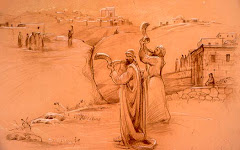SUCOT 5769

The Easy Mitzvah How [one meets] the mitzvah of dwelling in Suca? One should eat, drink, and live in the Suca, both day and night, as one lives at home on other days of the year: for seven days, the person should make his home his temporary dwelling, and Suca their permanent residence. - Shulján Aruj, Oraj Chaim 639:1 God said ...
"I have an easy mitzvah, and is called Suca. - Talmud, the 3rd Zara Avodá "In seven days during Succot moraréis," instructs the Torah, "... so that your generations will know that I did dwell on the Children of Israel on Succot when pulled from the land of Egypt" [1]. Our Sages, emphasizing the use of the verb "abide" by the above verses in the Torah, the mitzvah of Suca defined as an injunction which, during the duration of the festival of Succot (15 to 21 Tishrei), the Suca must become our primary residence. Everything that normally is done must be done at home in Suca [2].
So every year in autumn in the northern hemisphere, where the Land of Israel, when the weather becomes unfavorable, we moved out. For an entire week, we changed our home by a regular who is leaving us at the mercy of the elements, demonstrating our confidence in the providence of Di-s and their protection, as did our ancestors when I followed in the desert on a arid land "[3]. Morar Suca during the seven days it is a beautiful and inspiring, but hardly the one you describe as "easy." However, this mitzvah is singled out by the Talmud as the "easy mitzvah" of god!
Commander Connect
"Mitzvah, the Torah uses the word for God to guide and govern our lives, has a dual meaning: the word means both" commandment "and" connection. " In ordering the mitzvot, Di-s created the means by which we can establish a connection with Him hand distributes charitable mind ponders about the wisdom of the Torah, the heart that goes back to the top in prayer, including the stomach that digests matz consumed on the first night of Passover, all become instruments of divine will. There are mitzvot for each limb, body and faculty of man, and mitzvot that govern every area of life, so that none of us is not involved in our relationship with the Creator.
Therein lies the uniqueness of the mitzvah of Suca. While other mitzvot face each, a certain aspect of our person, the mitzvah of Suca provides a means by which the whole man is engaged in fulfilling the will of Di-s. Any person entering the Suca and lives in it. "The Suca is the only mitzvah which the person enters with his boots muddy," says the adage Hassidic. During the seven days of Succot, the Suca is our home, the environment for each of our efforts and activities.
Man
The specialty of the half Suca as all-encompassing connection with Di-s is best understood in light of the meaning of "home" for humans. Our Sages point out how deeply ingrained is the desire for a home in man. The desire for a home is much greater than the need of refuge and safety, meeting these needs alone, without a lot of land that can call itself one, it does not satisfy the anxiety of a home. The Talmud goes so far as to say that "He who owns a house is not a person" [4].
The need of a home is intrinsic to the soul of a man and a defining aspect of the human condition. Thus, the identification of the person to your home is not restricted to the hours that pass between its walls. Also when you are at work, visiting friends or taking a stroll in the park, as does the owner of a house which he works, visits or tours. Since his humanity that is incomplete without it, is an integral part of everything he does. During the seven days we do Suca of our home, it becomes part of our identity.
Everything we do, including what we do outside the Suca, is included in the "connection" with Di-s achieved by this mitzvah.
Easy As Life
Now we could understand why the mitzvah is the mitzvah of Suca "easy" Di-s. The person may address compliance with the commandments of Di-s in one of two ways: as a duty, or as to their existence. The observant "obedient" of mitzvot is the purpose of his life in the realization of their own personal ambitions. At the same time recognizing that Di-s is the master of the universe and the One who created him, gave him life, and will continue to maintain at each moment of its existence.
For what it feels like a duty to obey the commandments of Di-s. But then there is the person who understands that "but I was not created to serve my Creator" [5]. Recognizes this as the genuine "I" and the realization and implementation up to who and what. If one assumes the first approach, considering the observance of a mitzvah as a duty, both mitzvot be "difficult" as "easy."
One could meet them all, perhaps even willingly and happily, but some will be more enjoyable and inspiring, and more tedious and time consuming. Spending time, effort or money for a mitzvah will also affect the degree of difficulty that one experiences in its performance.
But when we see the fulfillment of the divine will as the very fiber of our lives, the concept of a difficult mitzvah is lacking. All mitzvot are "easy" because it does not constitute an imposition on our lives, our lives are. In fact, there is no division between the areas of mitzvah and "non-mitzvah" of our lives. When we deploy for the purpose of Di-s in the creation, all our lives, including those activities that are not explicit mitzvah events, become a unique and natural search to connect with our Creator and serve His will. All the mitzvot can be seen in one of two ways mentioned, but there is a mitzvah observance of the terms of which require nothing less than the second approach.
The mitzvah of Suca does not tell us to do something, tell us something that we are: a resident of Suca. The way to observe this mitzvah is to make the Suca our home, our environment, our roots, our very identity of seven days during each year of life [6]. And when we apply the model of the mitzvah of Suca our observance of all the commandments of Di-s, they, likewise, assume all-encompassing quality of Suca. They, too, become so "easy" like life.
Based on Likutéi Sijot, Vol. II, págs. 417-418 Notes: 1. Levítico 23:42-43. 2. Talmud, Sucá 28b; Mishné Torá, Laws of Sucá 6:5; Shulján Aruj, Oraj Jaím 639:1. This also defines when a person is not obliged to do something in the Suca: one is not obligated to eat or sleep in the Suca when, under similar conditions, would not at home(Talmud, ibíd.; Shulján Aruj, ibíd., subsecciones 2 y 5). 3. Jeremías 2:2. 4. Talmud, Ievamot 63a, según Tosafot, ibíd., sobre "sheéin lejá". 5. Talmud, Kidushín 82b. 6. Again this is due to the holiday of Succot derives its name from the mitzvah of Suca and not their other mitzvot (for example, take the "Four Species of Plants").











No hay comentarios:
Publicar un comentario